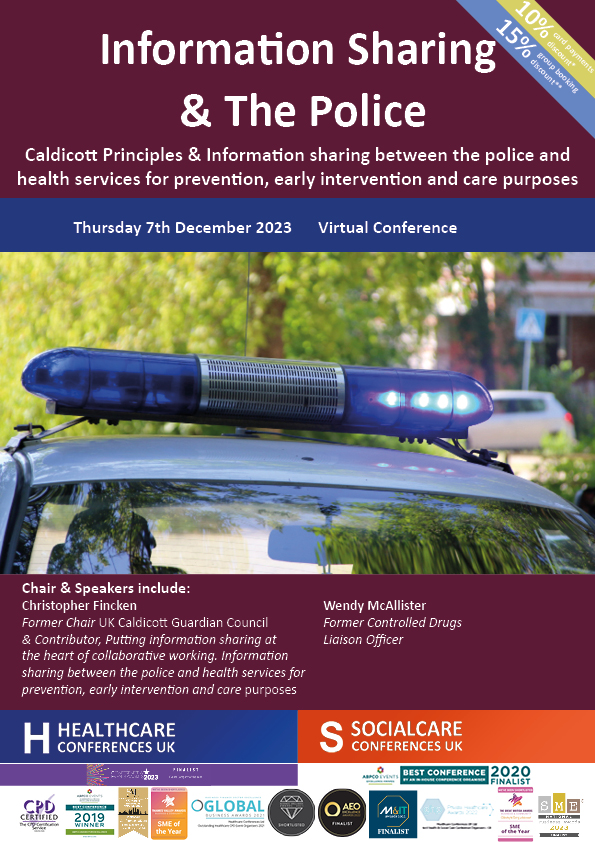Follow the conversation on Twitter #CaldicottPolice
Find out more about virtual attendance
This conference focuses on Information sharing between the police and health services for prevention, early intervention and care purposes. The day will look at principles of information sharing and understanding when to disclose and when not to.
The conference will include case studies from proactive information sharing for example in domestic violence cases for early intervention, and also reactive information sharing when an incident has occurred. The day will update delegates on the home office consultation ‘Police requests for third party information’ and the forthcoming 2023 UKCGC advice for Caldicott Guardians about information sharing with the police.
There will also be an update on the working with police on missing persons…” Enabling police to access a person’s health and social care information quickly and efficiently can be crucial when trying to trace a missing person.” UKCGC 2022
Our existing standards are clear that doctors should share confidential information with the police when it is in the public interest to do so. However, in line with their legal duty of confidentiality, this involves careful judgement about what to share to satisfy the intended purpose, striking a balance between individual and community rights.
“Police requests for third party material, which can include education, medical or local authority records are sometimes necessary to further an investigation, but are not always dealt with appropriately.”
We recognise and respect that the police need timely access to relevant and appropriate patient and service user information in order to conduct their investigations. However, the views of organisations considering the confidentiality of their patients and service users and those of police conducting an investigation do not always align. Requests made by the police are frequently too broad: asking for excessive amounts of information without providing a clear rationale as to why it is needed. This can be problematic for the health and social care sector, as the trust between an individual and health and care professionals is crucial to the delivery of care.
This conference will enable you to:
- Network with colleagues who are working to improve information sharing between the police and health/social care services
- Learn from outstanding practice in effective information sharing
- Reflect on national Caldicott developments, the home office consultation (Police requests for third party information) and the forthcoming 2023 UKCGC National guidance on information sharing with the police
- Improve the way decisions are made in your service using Caldicott principles
- Learn from case studies in Emergency Care, Safeguarding Vulnerable Adults, Mental Health, and Missing Persons
- Develop your skills in proactive and reactive information sharing with the police
- Understand how you can improve information sharing around domestic violence and safeguarding
- Appreciate when a request is reasonable and gain advice on dealing with unsubstantiated police requests
- Identify key strategies for supporting people in crisis through information sharing
- Ensure you are up to date with the latest legal developments including implications of GDPR in this area
- Self assess and reflect on your own practice and police perspectives
- Supports CPD professional development and acts as revalidation evidence. This course provides 5 Hrs training for CPD subject to peer group approval for revalidation purposes





